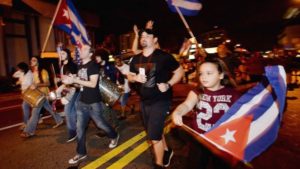
Within half an hour of the Cuban government’s official announcement that former President Fidel Castro had died, Miami’s Little Havana teemed with life — and cheers. Thousands of people banged pots with spoons, waved Cuban flags in the air and whooped in jubilation on Calle Ocho early Saturday. Honking and strains of salsa music from car stereos echoed against stucco buildings, and fireworks lit up the humid night sky.
Police blocked off streets leading to Cafe Versailles, the quintessential Cuban American hotspot where strong cafecitos — sweetened espresso — were as common as a harsh word about Fidel Castro. “Cuba si! Castro no!” they chanted, while others screamed “Cuba libre!” Celebration, not grief, permeated the atmosphere. That was no surprise. Castro has cast a shadow over Miami for decades, and in many ways, his policy and his power have shaped the city and its inhabitants.
Cubans fled the island to Miami, Tampa, New Jersey and elsewhere after Castro took power in 1959. Some were loyalists of Fulgencio Batista, the president prior to Castro, while others left with the hope they would be able to return soon, after Castro was toppled. He never was. Many others believed they would not be truly free under Castro and his communist regime. Thousands left behind their possessions, loved ones, and hard-earned educations and businesses, traveling to the U.S. by plane, boat or raft. Many Cubans died on the ocean trip to South Florida.
“We’re all celebrating, this is like a carnival,” said 72-year-old Jay Fernandez, who came to Miami when he was 18 in 1961. He and his wife and another woman held up a bilingual sign he’d made four years ago when Castro first became ill. “Satan, Fidel is now yours. Give him what he deserves. Don’t let him rest in peace.”
Many Cubans made successful livings and raised families in Miami despite having to learn a new language and start their lives over. Exiles who arrived as teenagers with no money in their pockets became millionaires, political leaders, clergy members, teachers — influential members contributing to the sturdy fabric of American society. Cemeteries in South Florida abound with the remains of those who fiercely wished Castro had died before them. Their children weep today because they could not see their parents and grandparents return to Cuba under a democratic regime, to see their homeland one more time.

Recent Comments